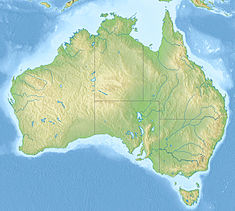
Accountants House is a heritage-listed commercial building and former warehouse located at 117–119 Harrington Street, in the inner city Sydney suburb of The Rocks in the City of Sydney local government area of New South Wales, Australia. It was designed by Spain and Cosh and built c. 1914. It is also known as Dawnay Day House. The property is owned by Property NSW, an agency of the Government of New South Wales. It was added to the New South Wales State Heritage Register on 10 May 2002.

The Australian Hotel is a heritage-listed hotel at 100–104 Cumberland Street, The Rocks, City of Sydney, New South Wales, Australia. The current structure was constructed from 1914 to 1915, and Property NSW owns the property, being added to the New South Wales State Heritage Register on 10 May 2002.

The Glenmore Hotel is a heritage-listed pub located at 96–98 Cumberland Street, in the inner city Sydney suburb of The Rocks in the City of Sydney local government area of New South Wales, Australia. It was designed by the Tooth and Co. resident architects and built in 1921 by D. M. Mitchell. The property is owned by Property NSW, an agency of the Government of New South Wales. It was added to the New South Wales State Heritage Register on 10 May 2002.

Penrhyn House is a heritage-listed former terrace houses, garage and factory and now retail stores located at 22–26 Playfair Street in the inner city Sydney suburb of The Rocks in the City of Sydney local government area of New South Wales, Australia. It was designed and built by John Turnbull Esq. during 1924. It is also known as The Rocks Centre and Playfair's Garage (Playfairs). The property is owned by Property NSW, an agency of the Government of New South Wales. It was added to the New South Wales State Heritage Register on 10 May 2002.

Lilyvale is a heritage-listed former town house and now restaurant located at 176 Cumberland Street, in the inner city Sydney suburb of The Rocks in the City of Sydney local government area of New South Wales, Australia. It was built from 1845 to 1847. The property is owned by Property NSW, an agency of the Government of New South Wales. It was added to the New South Wales State Heritage Register on 10 May 2002.

The Old Ambulance Station, The Rocks is a heritage-listed former ambulance station and public house and now the head quarters of The Argyle Network, a technology recruitment business located at 73 George Street in the inner city Sydney suburb of The Rocks in the City of Sydney local government area of New South Wales, Australia. It was built from 1842 to 1843 and the front facade was designed in 1927-8 by Howie Moffot & Co. It is also known as the Former Central District Ambulance Station and Ken Duncan Gallery. The property is owned by Property NSW, an agency of the Government of New South Wales. It was added to the New South Wales State Heritage Register on 10 May 2002.

Samson's Cottage wall remains is a heritage-listed former residence and now retail building located at 8 Kendall Lane, in the inner city Sydney suburb of The Rocks in the City of Sydney local government area of New South Wales, Australia. It was built for William Samson in 1844. It is also known as Samson's Cottage (wall remains) and Puppet Cottage (Samsons). The property is owned by Property NSW, an agency of the Government of New South Wales. It was added to the New South Wales State Heritage Register on 10 May 2002.

Samson's Cottage is a historic building in Sydney, Australia. It was built for William Cormack and built from 1883, and over the years, it has housed a Chinese laundry, an art gallery and an antique shop. It is located at 75–75.5 George Street in the inner city suburb of The Rocks in the City of Sydney local government area. The property is owned by Property NSW, an agency of the Government of New South Wales. It was added to the New South Wales State Heritage Register on 10 May 2002.

The Model Factory and Dwelling is a heritage-listed former factory, store and dwelling and now offices located at 120 Gloucester Street in the inner city Sydney suburb of The Rocks in the City of Sydney local government area of New South Wales, Australia. It was designed by George McRae and built from 1912 to 1913. It is also known as Chung Lun Building and (erroneously) the Housing Board Building. The property is owned by Property NSW, an agency of the Government of New South Wales. It was added to the New South Wales State Heritage Register on 10 May 2002.
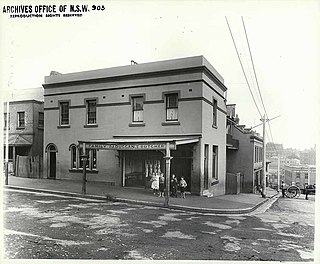
The Butchery Building is a heritage-listed restaurant and former terraced houses and butcher's shop located at 178–180 Cumberland Street, in the inner city Sydney suburb of The Rocks, New South Wales, Australia. It was built from 1890 to 1899. It is also known as The Butchery Buildings. The property is owned by Property NSW, an agency of the Government of New South Wales. It was added to the New South Wales State Heritage Register on 10 May 2002.

Lawson House is a heritage-listed warehouse, auction house and offices located at 212–218 Cumberland Street, in the inner city Sydney suburb of The Rocks in the City of Sydney local government area of New South Wales, Australia. It was designed by John Burcham Clamp and built during 1924 by Burcham Clamp and Finch. It is also known as Cadbury-Fry Building and Lawson Menzies Building. The property is owned by Property NSW, an agency of the Government of New South Wales. It was added to the New South Wales State Heritage Register on 10 May 2002.

The Long's Lane Precinct, also Longs Lane Precinct, comprise a series of heritage-listed terrace houses located at 130 Cumberland Street, 132–134 Cumberland Street, 136-138 Cumberland Street, and 140–142 Cumberland Street, in the inner-city Sydney suburb of The Rocks in the City of Sydney local government area of New South Wales, Australia. The terrace houses were built from 1888 to 1914, and they are also known as 130 Cumberland Street,132–134 Cumberland Street, 136–138 Cumberland Street, Watson's Butchery, and 140–142 Cumberland Street. The properties are owned by NashCap, an Australian-based real estate private equity firm. The precinct and the terrace houses were added to the New South Wales State Heritage Register on 10 May 2002.

107–109 George Street, The Rocks is a heritage-listed restaurant and former retail building, residence and bakery located at 107–109 George Street, in the inner city suburb of The Rocks in the City of Sydney local government area of New South Wales, Australia. It was built during 1860. It is also known as Rockpool Restaurant (former); and William Blue Dining. The property is owned by Property NSW, an agency of the Government of New South Wales. It was added to the New South Wales State Heritage Register on 10 May 2002.

149–151 George Street, The Rocks is a heritage-listed duty-free store complex and former retail building and residence located at 149–151 George Street, in the inner city Sydney suburb of The Rocks in the City of Sydney local government area of New South Wales, Australia. It was built from 1913 to 1913. It is also known as part of the Duty Free Store complex. The property is owned by Property NSW, an agency of the Government of New South Wales. It was added to the New South Wales State Heritage Register on 10 May 2002.
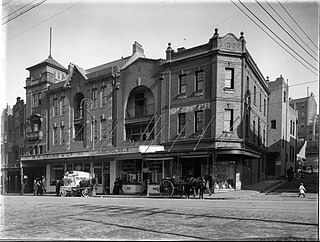
145 George Street, The Rocks is a heritage-listed duty-free store complex and former retail building and residence located at 145 George Street, in the inner city Sydney suburb of The Rocks in the City of Sydney local government area of New South Wales, Australia. It was built in 1892. It is also known as Currently part of Duty Free Store complex. The property is owned by Property NSW, an agency of the Government of New South Wales. It was added to the New South Wales State Heritage Register on 10 May 2002.
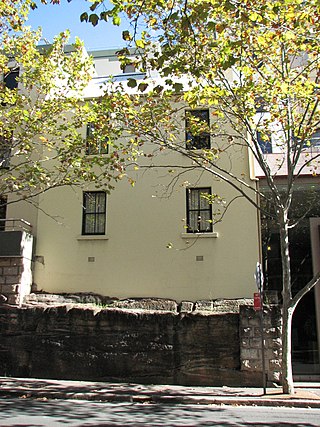
71 Harrington Street, The Rocks are heritage-listed serviced apartments and former terrace houses and shops located at 71 Harrington Street, in the inner city Sydney suburb of The Rocks in the City of Sydney local government area of New South Wales, Australia. It was built from 1860. It is also known as Sailors Return Hotel; Stafford Apts. and 75 Harrington Street; Clocktower Development. The property is owned by Property NSW, an agency of the Government of New South Wales. It was added to the New South Wales State Heritage Register on 10 May 2002.
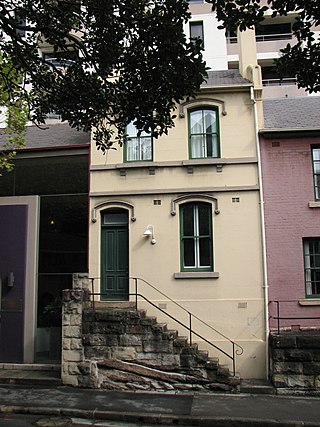
67 Harrington Street, The Rocks is a heritage-listed serviced apartments complex and former terrace house located at 67 Harrington Street, in the inner city Sydney suburb of The Rocks in the City of Sydney local government area of New South Wales, Australia. It was built from 1885. It is also known as Stafford Apartments and 75 Harrington Street; Clocktower Development. The property is owned by Property NSW, an agency of the Government of New South Wales. It was added to the New South Wales State Heritage Register on 10 May 2002.

The View Terrace facades are heritage-listed offices and a former residence and terrace houses located at 26–30 Gloucester Street, in the inner city Sydney suburb of The Rocks in the City of Sydney local government area of New South Wales, Australia. It was built from 1893 to 1893. It is also known as Formerly 22–30 Gloucester Street and part of 40 Gloucester Street development. The property is owned by Property NSW, an agency of the Government of New South Wales. It was added to the New South Wales State Heritage Register on 10 May 2002.

105 George Street, The Rocks is a heritage-listed shop and former residence located at 105 George Street, in the inner city Sydney suburb of The Rocks in the City of Sydney local government area of New South Wales, Australia. It was built during 1851 by persons unknown and redeveloped in 1985 by the Sydney Cove Redevelopment Authority with Co-Wyn Construction. It is also known as Kathmandu (current) and Beach Culture and Dorian Scott (former). Property NSW, an agency of the Government of New South Wales. It was added to the New South Wales State Heritage Register on 10 May 2002.
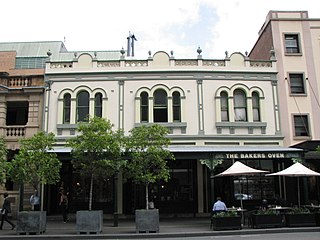
123–125 George Street, The Rocks are heritage-listed shops and former residences located in the inner Sydney suburb of The Rocks in New South Wales, Australia. It was built for Thomas Playfair during 1882. The property is owned by Property NSW, an agency of the Government of New South Wales. It was added to the New South Wales State Heritage Register on 10 May 2002.


